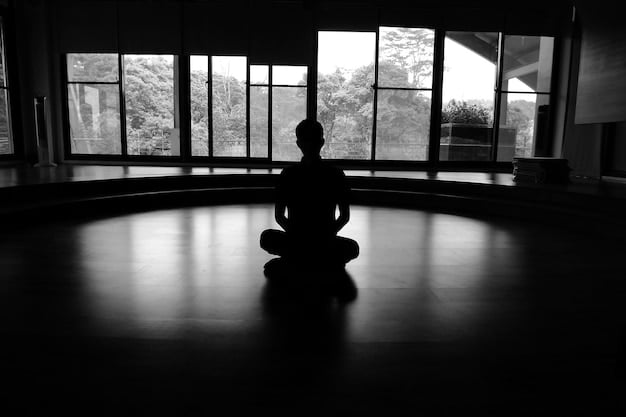Achieve Your Full Potential: A Roadmap to Personal Growth in 2025

Achieve Your Full Potential: A Roadmap to Personal Growth and Self-Discovery in 2025 offers a comprehensive guide to unlocking personal growth through goal setting, mindfulness, skill development, and resilience-building, providing actionable strategies for a fulfilling year.
Are you ready to embark on a journey of self-discovery and unlock your untapped capabilities? Achieve Your Full Potential: A Roadmap to Personal Growth and Self-Discovery in 2025 is your guide to setting meaningful goals and turning them into reality.
Setting the Stage for Personal Growth in 2025
Personal growth is a continuous journey, not a destination. As we approach 2025, it’s an opportune time to reflect, reassess, and realign our lives to achieve our full potential. This involves setting clear intentions and understanding the necessary steps to evolve into the best version of ourselves.
Let’s explore the foundational elements needed to set the stage for a transformative year.
Self-Reflection: Understanding Your Starting Point
Before embarking on a personal growth journey, it’s crucial to understand where you currently stand. Self-reflection provides clarity on your strengths, weaknesses, values, and passions.
Identifying Core Values
Understanding what truly matters to you forms the bedrock of meaningful growth. Aligning your goals with your core values ensures that your journey is authentic and fulfilling.
- Discover your core values through introspection.
- Reflect on past experiences and identify recurring themes.
- Prioritize values that resonate deeply with your authentic self.
Self-reflection is the cornerstone of personal growth. It allows us to understand our motivations, fears, and desires. By spending time in introspection, we can identify what areas of our lives need the most attention and where we can focus our energy for maximum impact. Consider journaling, meditation, or consulting with a therapist to deepen your self-awareness.
Defining Your Goals: A Roadmap to Success
Clear and well-defined goals are the compass that guides your personal growth journey. Without a clear sense of direction, it’s easy to get lost or sidetracked. Setting effective goals involves understanding what you want to achieve and creating a plan to get there.
Let’s delve into essential components of effective goal-setting.

SMART Goals: A Practical Framework
SMART goals provide a structured approach to goal-setting, ensuring that your objectives are Specific, Measurable, Achievable, Relevant, and Time-bound.
Breaking Down Big Goals
Large, intimidating goals can be overwhelming. Breaking them down into smaller, manageable steps makes the journey less daunting and more achievable.
- Identify the major milestones required to achieve your goal.
- Break each milestone into smaller, actionable tasks.
- Schedule these tasks into your daily or weekly routine.
Goal setting should be a dynamic process. As you progress, regularly assess your goals and adjust them as needed. Life circumstances change, and your initial goals may no longer align with your current priorities. Flexibility and adaptability are key components of successful personal growth. Keep your goals visible and review them regularly to stay motivated and on track.
Cultivating Mindfulness and Presence
In today’s fast-paced world, cultivating mindfulness and presence can profoundly impact your personal growth journey. By focusing on the present moment, you can reduce stress, increase self-awareness, and live more intentionally.
Explore strategies for becoming more mindful in your daily life.
Meditation and Breathing Exercises
These practices help center your mind and bring you back to the present moment. Regular meditation can reduce anxiety and improve focus.
Mindful Activities
Engage in activities that demand your full attention, such as walking in nature, listening to music, or practicing a hobby.

- Choose activities that resonate with your interests.
- Eliminate distractions and immerse yourself fully in the experience.
- Notice the sensory details and appreciate the present moment.
Mindfulness is not about achieving a state of perfect tranquility, but rather about developing non-judgmental awareness of your thoughts and feelings. Start with short, guided meditation sessions and gradually increase the duration as you become more comfortable. Integrate mindful practices into your daily routine, such as paying attention to your breath while waiting in line or savoring each bite of your meals.
Developing New Skills and Knowledge
Continuous learning is a cornerstone of personal growth. Acquiring new skills and knowledge not only enhances your capabilities but also keeps your mind engaged and curious. Whether it’s learning a new language, mastering a software program, or delving into a new subject, the process of learning expands your horizons and boosts your confidence.
Let’s explore approaches for effective skill development.
Identifying Skill Gaps
Determine which skills will help you achieve your goals and identify areas where you need improvement.
Online Courses and Workshops
Leverage online platforms to access a wealth of courses and workshops on various subjects.
- Explore reputable online learning platforms like Coursera, Udemy, and Skillshare.
- Attend webinars and workshops to learn from experts in your field.
- Seek out courses that offer practical, hands-on learning experiences.
Skill development should be an active and intentional process. Create a structured learning plan, set aside dedicated time for practice, and seek feedback from mentors or peers. Embrace challenges as opportunities for growth and celebrate small victories along the way. Remember that mastery takes time and effort, so be patient with yourself and persistent in your pursuit of new skills.
Building Resilience and Overcoming Obstacles
The path to personal growth is not always smooth. Obstacles and setbacks are inevitable. Building resilience – the ability to bounce back from adversity – is essential for staying on track and continuing to grow.
Let’s explore strategies for cultivating resilience and navigating challenges.
Developing a Growth Mindset
Embrace challenges as opportunities to learn and grow. View failures as temporary setbacks rather than reflections of your worth.
Practicing Self-Compassion
Treat yourself with kindness and understanding, especially during difficult times. Acknowledge your struggles and offer yourself the same support you would give to a friend.
- Challenge negative self-talk and replace it with positive affirmations.
- Forgive yourself for mistakes and learn from them.
- Focus on your strengths and accomplishments.
Resilience is not about avoiding challenges, but rather about developing the mental and emotional tools to navigate them effectively. Cultivate a strong support network, practice stress-reduction techniques, and prioritize self-care. Celebrate your progress and acknowledge your resilience in overcoming obstacles. Remember that every challenge is an opportunity to learn, grow, and become stronger.
Creating a Supportive Environment
Your environment plays a significant role in your personal growth journey. Surrounding yourself with supportive people, resources, and practices can significantly enhance your progress. Conversely, a toxic or unsupportive environment can hinder your growth and undermine your efforts.
Let’s explore how to create a nurturing environment.
Building a Strong Support Network
Connect with people who believe in you, encourage your growth, and provide honest feedback. Share your goals and aspirations with supportive friends, family members, or mentors.
Setting Boundaries
Protect your time and energy by setting healthy boundaries with people who drain you or undermine your efforts. Learn to say no to commitments that don’t align with your goals or values.
- Identify your boundaries and communicate them clearly to others.
- Prioritize activities that energize and uplift you.
- Create a physical space that inspires and motivates you.
A supportive environment fosters confidence, resilience, and motivation. Seek out positive influences, eliminate distractions, and create a space that nurtures your personal growth. Regularly assess your environment and make adjustments as needed to ensure that it continues to support your journey.
Conclusion
As you embark on your personal growth journey in 2025, remember that it’s a marathon, not a sprint. Embrace the process, stay committed to your goals, and celebrate your progress along the way. By setting the stage for personal growth, defining your goals, cultivating mindfulness, developing new skills, building resilience, and creating a supportive environment, you can unlock your full potential and live a more fulfilling life. Make 2025 a year of transformative growth and self-discovery.
| Key Point | Brief Description |
|---|---|
| 🎯 Goal Setting | Define SMART goals to guide your journey. |
| 🧘 Mindfulness | Practice presence to reduce stress and increase awareness. |
| 📚 Skill Development | Acquire new skills to enhance capabilities. |
| 💪 Resilience | Build the ability to bounce back from setbacks. |
FAQ
▼
Personal growth is the continuous process of self-improvement, involving the development of skills, knowledge, and character traits to achieve one’s full potential and live a more fulfilling life.
▼
SMART goals are Specific, Measurable, Achievable, Relevant, and Time-bound. Ensure your goals are clearly defined, have measurable progress indicators, are realistic, align with your values, and have a set deadline.
▼
Mindfulness enhances self-awareness, reduces stress, and promotes presence. By focusing on the present moment, you can better understand your thoughts and feelings, leading to more intentional and fulfilling decisions.
▼
Build resilience by developing a growth mindset, practicing self-compassion, cultivating a strong support network, and viewing failures as learning opportunities. These strategies help you bounce back from adversity.
▼
A supportive environment is one that fosters confidence, motivation, and well-being. Create one by surrounding yourself with positive people, setting healthy boundaries, and engaging in activities that uplift and energize you.
Conclusion
Achieving your full potential is a journey, not a destination. By incorporating these strategies into your daily life, you can embark on a path of continuous growth, self-discovery, and fulfillment. Embrace the challenges, celebrate the victories, and continue to evolve into the best version of yourself in 2025.





